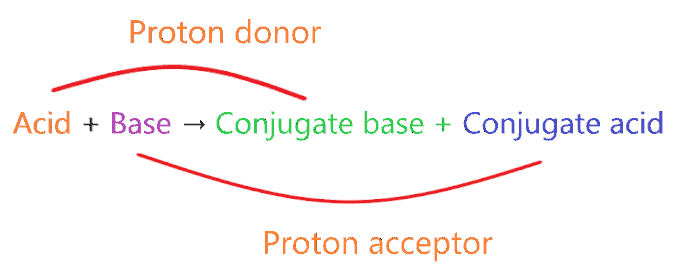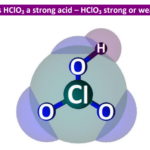Is Potassium chloride (KCl) an acid or base or salt? Strong or Weak

Potassium chloride is odorless and has a white appearance composed of potassium and chlorine having the chemical formula KCl, also known as the potassium salt. It belongs to the metal halide salt family. It has a strong saline taste and is readily soluble in water.
The major use of potassium chloride is for making fertilizer. Potassium chloride is one of the important ingredients in the human body for producing energy, balancing blood pressure, smooth muscle contraction, etc.
In this article, we will study Is Potassium chloride (KCl) an acid or base or neutral salt?
Is KCl an acid or base?
KCl is neither an acid nor a base. It is made from the neutralization reaction of the strong acid, namely hydrochloric acid (HCl) with a strong base, namely potassium hydroxide (KOH). The pH value of the aqueous solution of KCl is 7. Because strong acid and a strong base will neutralize each other effects and a neutral solution forms.
| Name of Molecule | Potassium chloride (KCl) |
| Acid or Base? | Neither acid nor base |
| Molar mass | 74.555 g·mol−1 |
| pH | 7 |
Why KCl is not acidic in nature?
As we know, the acid compound has a pH value less than 7, and they release H+ ions whenever dissolved in an aqueous solution. In short, an acidic compound is a proton donor which increases the concentration of hydrogen ions in the solution.
In the case of KCl, it is not considered an acid because it doesn’t have any H+ or proton ion to donate. So, on dissolving KCl in an aqueous solution, it doesn’t induce any effect i.e. Aqueous solution remains the same as before, after dissolving KCl.
Let’s elaborate more on why KCl doesn’t hold the property of acidic with the help of two acid-base theories (a). Arrhenius acid theory (b). Bronsted-Lowry acid theory.
(a). Arrhenius acid theory
According to Arrhenius’s theory of acid ” A compound is said to be acid when added in water, it increases the number of H+ ions in solution.

Now, KCl on dissolving in an aqueous solution, split into two ions K+ and Cl–. As we see, it doesn’t have any H+ ion to donate.
Hence, KCl is not qualified as Arrhenius acid as its aqueous solution doesn’t contain any H+ ions.
(b). Bronsted-Lowry acid theory
This theory is an enhanced version of Arrhenius’s theory given for acid-base. You can read these theories’ concepts here.
Bronsted-Lowry acid theory state that a compound having the ability to donate the proton to another compound is categorized as Bronsted-Lowry acid.
Since KCl doesn’t have any proton to donate. So, we can say KCl is neither Arrhenius acid nor Bronsted-Lowry acid as per their acidic theories.
Why KCl is not base in nature?
The species having a pH value of more than 7 are said to be basic in nature or “A base is any substance that increases the concentration of OH– ion in aqueous solution”.
Or you can say a base is a compound that accepts hydrogen ions or protons.
So, in the case of KCl, as like acidic component(H+), it doesn’t have OH– ion also, therefore, dissolving in an aqueous solution, it does not alter the nature of the solution i.e. it remains the same as before.
As per Bronsted-Lowry base theory, a compound is said to be base when it makes conjugate acid by accepting one proton from other species, or as per Arrhenius base theory, a compound produces OH– ion in an aqueous solution.
“Conjugate acid is formed when one proton is added to parent base”.

Since KCl doesn’t have the ability to accept the proton from other species, it cannot make any conjugate acid, nor it produces OH– ions in an aqueous solution.
Therefore, we can say, KCl is not a Bronsted-Lowry base as per its theory.
Why KCl is neutral salt?
A neutral salt means showing no effect of acidic or alkaline properties when dissolved in water.
Or neutral salt is a salt resulting from the neutralization reaction between a strong acid and strong base.
A neutralization simply means the interaction of acid and base to form the water molecule and salt compound.

Now let’s come to the point of Why KCl is neutral salt? As we know KCl salt is formed when the strong base (KOH) and strong acid (HCl) react with each other. Or you can say KCl salt formed by the neutralization reaction carries between HCl acid and KOH base.
⇒ KOH + HCl → KCl + H2O
As per the concept of the neutralization reaction-
⇒ Strong base + Weak acid = Basic solution
⇒ Stronger acid + Weak base = Acidic solution
⇒ Strong acid + Strong base = Neutral solution
That means the interaction of strong base and weak acid forms a basic solution, stronger acid with weak base forms an acidic solution, and stronger acid with stronger base forms a neutral solution.
As we discussed, KCl is formed when strong acid (HCl) reacts with a strong base (KOH). Hence, as per the above concepts, when a neutralization reaction carries between a strong acid and strong base, it will form neutral salt having a pH value equal to 7.

Using the ionic reaction of potassium chloride formation we can also understand why the aqueous solution of KCl is considered neutral.
We know KCl is formed when KOH reacts with the HCl.
⇒ KOH + HCl → KCl + H₂O
The ionic reaction of the above reaction can be written as-
⇒ K+ + OH– + H+ + Cl– → K+ + Cl– + H2O
Common ions from both(left and right sides) should be canceled out of each other.
Remaining ions we get-
⇒ OH– + H+ → H2O
∴ The final solution of KCl contains an equal number of H+ and OH–, therefore, its aqueous solution is neutral.
Also, The ions of KCl, K+ is the very weak conjugate acid of KOH, and Cl– is a very weak conjugate base of HCl, hence, both these ions are very weak in nature, therefore, the effect of these ions on altering the pH value of the aqueous solution is almost zero.
The conjugate acid of KOH is K+ which is too weak to function as an acid in water. The conjugate base of HCl is Cl– which is too weak to function as a base in water.
This reason can also be considered for explaining why the aqueous solution of potassium chloride (KCl) is neutral with no acidic or alkaline properties.
Some examples of neutral salt – NaNO3, NaCl, KNO3, KBr, NaBr, etc.
Also Read:
Some examples of acidic salt – NH4NO3, NH4Br, NH4Cl, etc.
Also Read:-
Some examples of basic salt – Na2CO3, NaF, NaCN, Soap, etc.
Also Read:-
The pH value of potassium chloride
“pH is a measure of hydrogen ion(H+) and hydroxide ion(OH–) concentration in aqueous solution.
Since the water solution of potassium chloride neither contains H+ ion nor hydroxide ion, so there is no effect on its pH value.
Also, the dissociation of KCl into K+ and Cl– ions in water solution has no effect on altering the pH value.
Therefore, the pH value of a water solution of potassium chloride is 7.
Also Check:
Uses of Potassium chloride
- The major use of potassium chloride is for making fertilizers.
- It is used in medicine to treat the low blood pressure condition in the human body.
- It is used as the raw material required for the manufacturing of potassium metals.
- In some cases, potassium chloride is also used as a fire extinguishing agent.
- It is also used in the manufacturing of soaps.
Properties of Potassium chloride
- It has a melting point of 770 °C and a boiling point of 1,420 °C.
- The crystal structure of KCl is made up of face-centered cubic (FCC) unit cells.
- It is soluble in glycerol, alkalies, and water but insoluble in ether.
- It is extracted from minerals such as carnallite, potash, and sylvite.
- It has a coordinate octahedral geometry.
Summary
Potassium chloride has a saline taste and appears as a white crystalline solid having a molar mass of 74.555 g·mol−1. It is one of the important metal halides used for making fertilizer also called potash. At last, the Overview of this article on “Is KCl an acid or base or neutral salt?”
- Is Potassium chloride(KCl) an acid or base or salt? KCl is a neutral salt. It is formed from the neutralization reaction carried out between strong acid, namely Hydrochloric acid (HCl), and strong base, namely Potassium hydroxide (KOH).
- Potassium chloride neither held acidic properties nor alkaline. Because of the absence of the two most important ions needed for acid and base nature, that is H+ and OH–.
- The pH value of potassium chloride is 7.
About the author
Vishal Goyal is the founder of Topblogtenz, a comprehensive resource for students seeking guidance and support in their chemistry studies. He holds a degree in B.Tech (Chemical Engineering) and has four years of experience as a chemistry tutor. The team at Topblogtenz includes experts like experienced researchers, professors, and educators, with the goal of making complex subjects like chemistry accessible and understandable for all. A passion for sharing knowledge and a love for chemistry and science drives the team behind the website. Let's connect through LinkedIn: https://www.linkedin.com/in/vishal-goyal-2926a122b/

